Key takeaways:
- Networking with authors is essential for opening opportunities, sharing insights, and fostering genuine relationships that support growth and inspiration.
- Identify target authors by aligning on genre, audience, career stage, and shared interests to facilitate meaningful interactions.
- Utilize social media platforms effectively by engaging authentically, joining writing groups, and participating in discussions to build strong connections.
- Follow up on interactions and offer support or collaboration to deepen relationships and create new opportunities in the writing community.
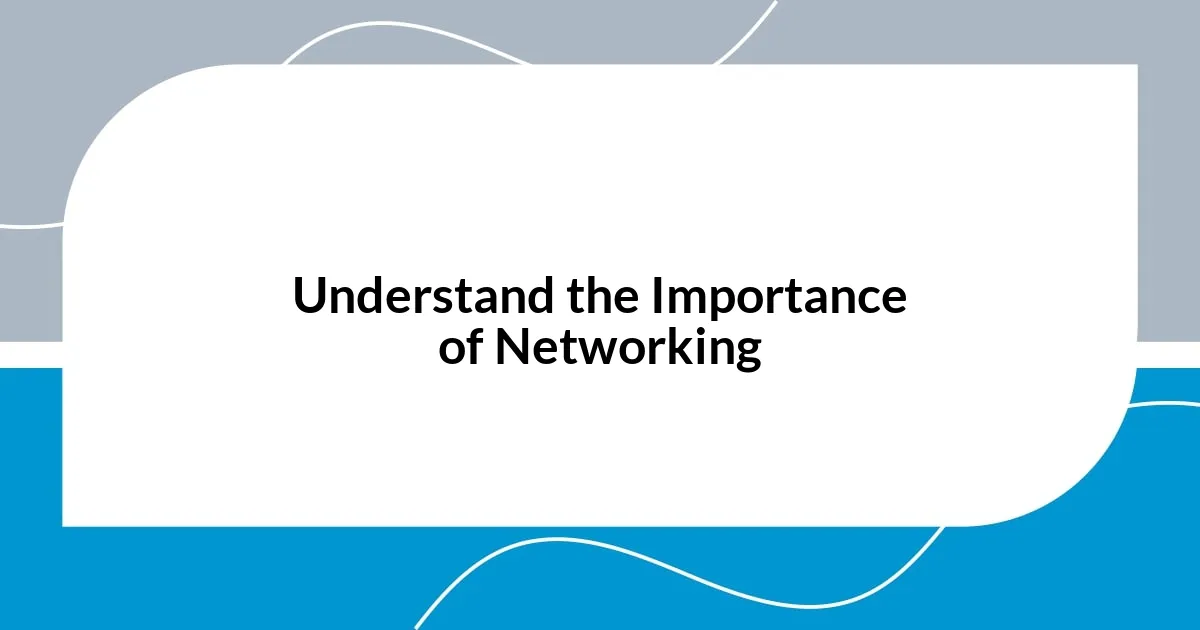
Understand the Importance of Networking
Networking with authors is crucial because it opens doors to countless opportunities. I remember attending a local writers’ workshop where I struck up a conversation with an author whose debut novel had just hit the shelves. That simple interaction not only led to a fruitful friendship but also helped me gain insights about the publishing process that I would have otherwise struggled to learn on my own.
Why is it that some writers seem to climb the ladder of success effortlessly? Often, it’s their ability to connect with others. I’ve seen firsthand how sharing experiences and resources among writers can lead to collaborative projects and even mentorships. It reinforces the idea that networking is not just about collecting contacts; it’s about building genuine relationships that can foster growth and inspiration.
When you network, you’re not just expanding your circle; you’re also enriching your own understanding of the industry. I once reached out to an accomplished writer on social media, and to my surprise, they took the time to respond, sharing tips that changed the direction of my writing. This taught me that each connection holds the potential for transformation—both personally and professionally. Isn’t it exciting to think about how a simple conversation could propel your journey forward?

Identify Your Target Authors
Identifying your target authors is a crucial step in effective networking. I learned this the hard way at a book fair where I attempted to connect with everyone in sight. It wasn’t until I focused on authors within my genre that I truly made meaningful connections. Targeted interactions can lead to more productive conversations, as you share a common ground and passion.
To pinpoint the right authors for you, consider these factors:
- Genre Alignment: Look for authors writing in the same genre as you to facilitate more relevant discussions.
- Similar Audience: Identify authors whose readership aligns with your target audience for potential collaborations.
- Stage of Career: Connect with authors at similar career stages. It fosters a sense of camaraderie and mutual support.
- Shared Interests: Seek out authors with similar themes or messages in their work, as it can create deeper connections.
I remember my excitement when I discovered an indie author who wrote about mental health—just like I did. Our conversations flowed easily, and we ended up co-hosting a panel discussion. That experience solidified my belief in the power of targeting the right authors to connect with.

Utilize Social Media Platforms
Utilizing social media platforms is one of the most effective ways to network with authors today. When I first ventured into this digital space, I felt overwhelmed by the sheer volume of options. However, I soon realized that platforms like Twitter, Instagram, and LinkedIn provide unique environments for building relationships. Each platform has its vibe, which influences how authors present themselves and interact. For example, Twitter’s fast-paced exchanges are perfect for quick conversations, while Instagram allows for more visual storytelling.
In my experience, engaging with authors on social media goes beyond just following them or liking their posts. I remember commenting on a fellow author’s Instagram post, sharing how their book cover inspired my own design. To my surprise, they replied, leading to a deeper discussion about our mutual inspirations in storytelling. It was a lesson learned: genuine engagement can turn into a meaningful connection. Don’t hesitate—ask questions or share your thoughts, and you might find an author eager to respond.
On platforms like Facebook, joining specific writing groups can also offer a supportive community. In one group, I came across an author who shared their struggles with imposter syndrome, a feeling I also faced. Our conversations blossomed into a virtual friendship, and we began exchanging feedback on each other’s works. Such connections can provide valuable insights and support, making social media not just a networking tool, but a nurturing space for writers.
| Social Media Platform | Benefits for Networking with Authors |
|---|---|
| Facilitates quick interactions and trending discussions. | |
| Visual storytelling, enabling connection through imagery and design. | |
| Professional networking, ideal for sharing industry insights and career growth. | |
| Facebook Groups | Community support, allowing deeper conversations and shared experiences. |
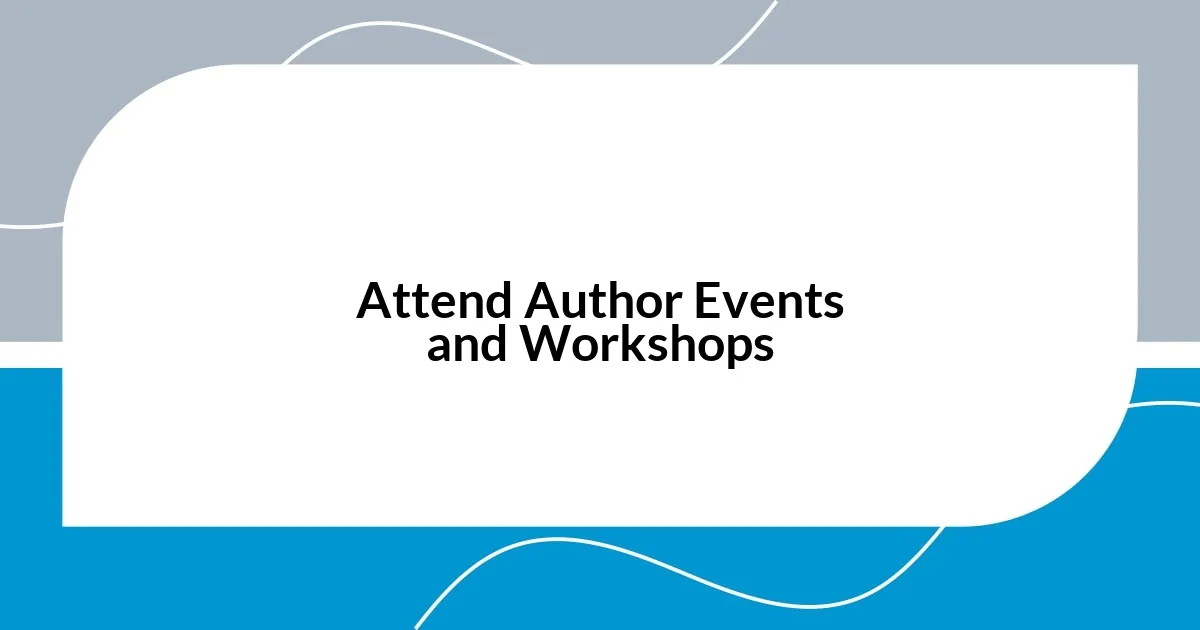
Attend Author Events and Workshops
Attending author events and workshops can be a game-changer for anyone looking to expand their network. A few years back, I found myself at a local literary festival feeling a bit nervous. But when I engaged with other attendees, sharing laughter and ideas over coffee, I realized it was a golden opportunity for connection. Events like these foster an atmosphere where authors can freely share experiences and insights. Isn’t it exciting to think about meeting someone who has faced similar challenges in their writing journey?
At these gatherings, you have the chance to participate in workshops, which can be incredibly rewarding. I still remember a workshop on character development that I attended; not only did I learn new techniques, but I also bonded with the authors sitting next to me. We exchanged contact information and soon started a shared critique group. It’s amazing how one workshop can lead to long-lasting relationships and collaborative opportunities. I wonder how many valuable insights are waiting for you at the next event you attend!
Networking is not just about making connections, though; it’s also about participating in conversations that inspire you. Consider asking authors about their writing processes or their experiences in the industry. During one panel session, I asked a question about overcoming writer’s block, and the author’s response resonated deeply with me. Not only did it spark an engaging discussion, but it also opened the door for further conversation afterward. Events like this create a dynamic environment—why not seize the moment and share your own story?
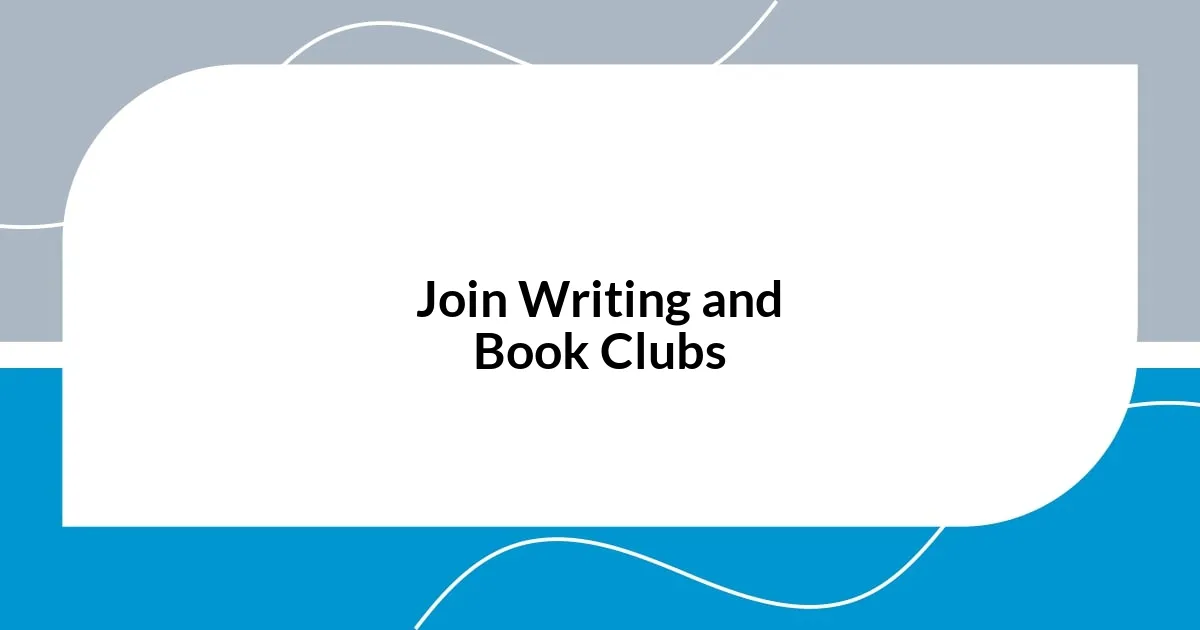
Join Writing and Book Clubs
Joining writing and book clubs can be one of the most enriching experiences for aspiring authors. A few years ago, I stumbled upon a local writing group that met biweekly at a cozy café. It felt a bit daunting at first, but the moment I shared my short story, I was met with warmth and thoughtful feedback. It was refreshing to see how this shared passion turned strangers into friends, all eager to support each other’s writing journeys.
In my experience, book clubs are equally beneficial. I remember joining a club focused on contemporary fiction, and each meeting brought a new layer of discussion and perspective. One night, as we dissected a particularly emotional novel, I found myself sharing how the themes resonated with my own life. The connection that sparked among fellow members was profound. It solidified my belief that literature has an incredible way of uniting us, often leading to beautiful friendships.
Moreover, these clubs often host guest authors for discussions or readings, providing golden opportunities for networking. I once attended a session where an author shared their writing process, and afterward, I got the courage to ask them about their motivation behind a specific scene. Surprisingly, the conversation flowed effortlessly, which led to some invaluable advice on developing strong characters. This experience taught me that being part of a writing or book club isn’t just about improving craft; it’s about building relationships that can last a lifetime. Why not take the plunge and see how these connections can enhance your own writing journey?
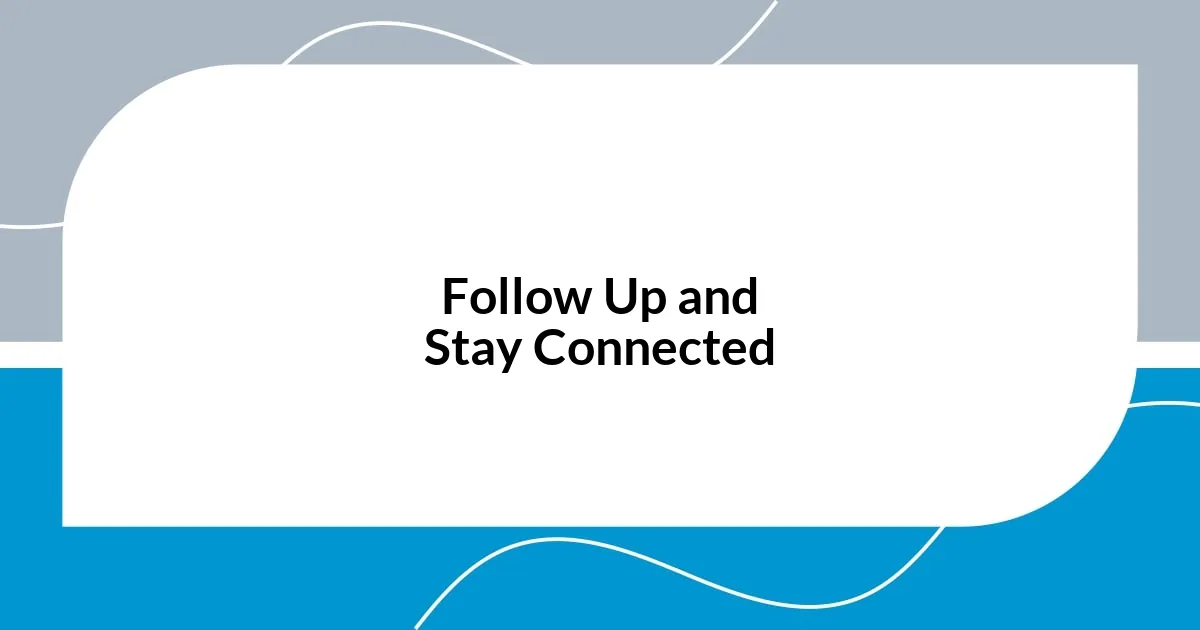
Follow Up and Stay Connected
Continuing the connections you make at author events and writers’ groups is essential. I vividly remember hitting “send” on a thank-you email to an author after an insightful workshop—almost instantly, I received a warm reply. It was a simple gesture, yet it established an ongoing dialogue that led to exchanging resources and tips on writing. How often do we underestimate the power of a thoughtful follow-up?
After meeting authors, I always strive to engage with them on social media. A while back, I tweeted about a valuable piece of advice I received from an author during an event. Much to my surprise, they responded and shared additional insights, which made me feel recognized and appreciated. These interactions can transform a fleeting encounter into a more meaningful connection. Have you thought about how nurturing digital conversations can deepen your relationships?
Staying connected doesn’t have to feel transactional; it can be genuinely rewarding. When I follow up with someone, I often mention a specific point from our last conversation, showing I care about our discussions. Recently, I reached out to a fellow writer I met at a book club, reminding them of our talk about genre blending. We ended up brainstorming together, resulting in a collaborative piece. Isn’t it fascinating how a simple gesture can blossom into such engaging opportunities?
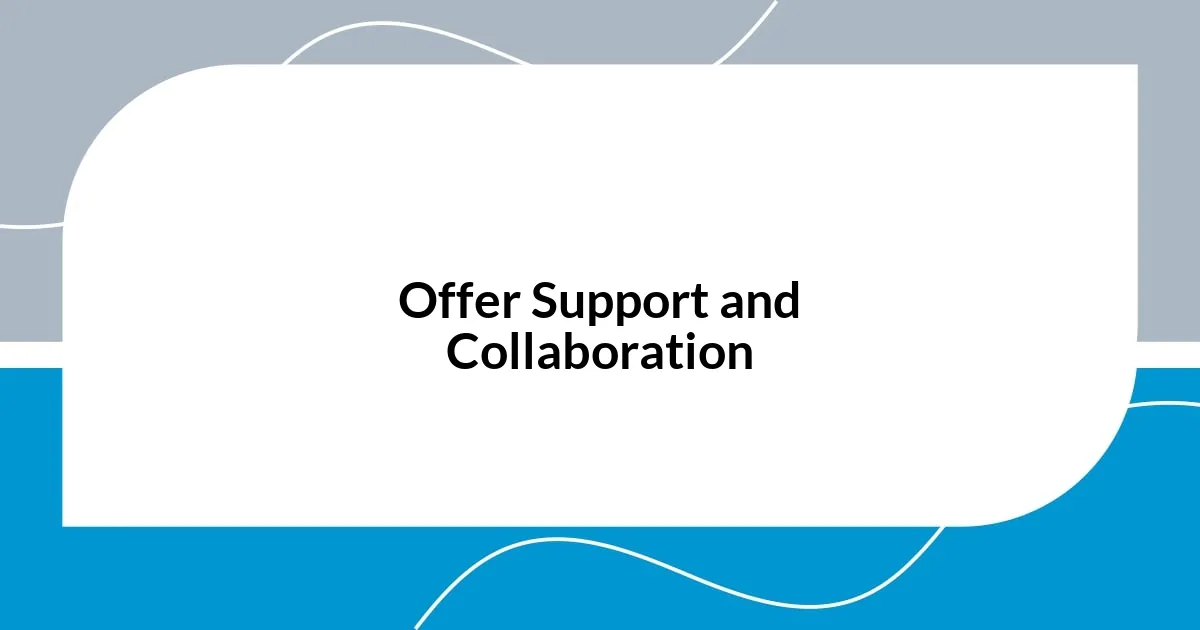
Offer Support and Collaboration
Offering support and collaboration can take many forms, and I’ve found that sharing resources is one of the most effective ways to strengthen connections with other authors. A few months ago, I came across a website that featured excellent writing prompts and tools. I didn’t hesitate to share it with a fellow writer who was struggling with his next project. His gratitude reminded me of how a small gesture can create a ripple effect of goodwill—he later sent me his latest short piece, and our exchange ignited a creative spark for both of us. Isn’t it amazing how helping others can also illuminate your own path?
Collaboration can also blossom into something bigger, as I discovered when I co-hosted a writing workshop with another author. Initially, I focused on improving my teaching skills, but what unfolded surprised me. Our brainstorming sessions were filled with laughter and rich ideas, which ultimately led to a compiled anthology of our students’ work. Watching these aspiring writers flourish was rewarding beyond words. Have you ever considered how teamwork could amplify your message while building your community?
I’ve seen that showing genuine interest in another author’s work can lead to beautiful collaborations. Once, I found a writer whose style resonated with me deeply, so I reached out to discuss our shared fascination with magical realism. Our conversation quickly morphed into plans for a joint project, blending our voices into a collection of linked short stories. This experience taught me that when you extend a hand and express sincere interest, you open the door to creative possibilities that can change your writing journey forever.